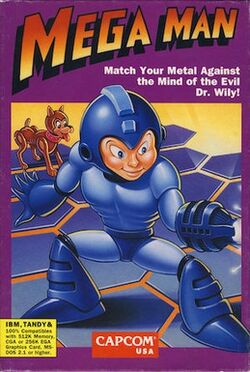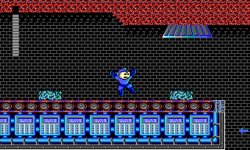Software:Mega Man (DOS)
| Mega Man | |
|---|---|
 | |
| Developer(s) | Rozner Labs |
| Publisher(s) | Hi Tech Expressions Capcom |
| Designer(s) | Stephen Rozner |
| Series | Mega Man |
| Platform(s) | DOS |
| Release | 1990 |
| Genre(s) | Action, platform |
| Mode(s) | Single-player |
Mega Man is a 1990 action-platform video game developed by Stephen Rozner, an ex-employee of Capcom U.S.A and published by Hi Tech Expressions. A sequel to the game, based on Mega Man 3, was released for DOS in 1992, skipping the second entry.
The game has been heavily panned, with many calling it one of the worst PC games ever.
Gameplay

Compared to the six "Robot Masters" from the original 1987 game, Mega Man has three "Masters" that can be selected: Dyna Man, Sonic Man, and Volt Man. In each level, the player-character, Mega Man, fights through various enemies and obstacles before facing the level's "Robot Master" boss at the level's end.[1]
Development
Mega Man was developed by Stephen Rozner under his company Rozner Labs.[2] Rozner had previous experience working with a Capcom intellectual property, having done a Commodore 64 port of Street Fighter. After Capcom U.S.A., Inc. purchased Riggs International, a small video game development company consisting of Rozner "an artist and the boss". Capcom intended to use Riggs International as an internal development studio but those plans never came to fruition. Rozner was then tasked with managing external developers. During this time, Rozner began work on Mega Man himself. During development, Rozner left Capcom U.S.A who agreed to allow Rozner to release the game once it was finished. Unable to access Capcom's asset files and assembly code, Rozner decided to start from scratch and make "whatever he wanted" since he was a fan of the original NES Mega Man games.[3] It was released for DOS in 1990.
Reception
The game has been heavily panned, with many calling it one of the worst PC games of all time. PC Gamer put it on its list of the worst PC ports ever, calling it a "monstrous conversion" and a "terrible port".[4] The game also made USGamer's list of the worst games on the Internet Archive, calling the level designs "uninspired" and the lack of music "the worst part".[5] 1UP.com's Nadia Oxford listed it as one of the worst games in the Mega Man franchise.[6] Jeremy Parish for Polygon ranked it as the worst game in the main series, calling it "a half-baked, unbalanced, hideous-looking game".[7] Christian Nutt and Justin Speer for GameSpot called the game's controls and graphics "abysmal".[8]
Neil Foster of Hardcore Gaming 101 gave the game a negative write-up, while he found the addition of EGA visuals to be a plus, he found the graphics overall to be lacking in imagination when compared to the NES Mega Man games. He also panned the gameplay, which he considered "dull" and "cheap" with the level design making it "drag" and stating that "everything hits too hard and there’s little mercy invincibility in-between" leading to quick deaths. and said that it had enemies that are too short to shoot and narrow passages with low ceilings that made it difficult to make jumps. Foster also went on to pan the controls, saying that they make the game harder than it needs to be. Foster noted that some of the game's art assets were stolen and used in Duke Nukem.[1] In his book "The Untold History of Japanese Game Developers", John Szczepaniak was less negative towards the game, considering it not to be as bad as fans of the series made it out to be.[9]
References
Citations
- ↑ 1.0 1.1 Foster, Neil. "Mega Man (DOS)". http://www.hardcoregaming101.net/mega-man-dos/. Retrieved 15 August 2019.
- ↑ Szczepaniak 2014, pp. 686.
- ↑ Wilde, Tyler. "The story of the bizarre Mega Man DOS games". https://www.pcgamer.com/the-story-of-the-bizarre-mega-man-dos-games/. Retrieved 15 August 2019.
- ↑ Elliot, Matt. "The worst PC ports ever". https://www.pcgamer.com/the-worst-pc-ports-ever/. Retrieved 15 August 2019.
- ↑ Williams, Mike. "The Worst Games on The Internet Archive". https://www.usgamer.net/articles/the-worst-games-on-the-internet-archive-1. Retrieved 15 August 2019.
- ↑ Oxford, Nadia (24 May 2007). "Mega Manniversary: Mega Mediocrity". Archived from the original on 19 October 2007. https://web.archive.org/web/20071019165541/http://www.1up.com/do/feature?cId=3159805.
- ↑ Parish, Jeremy (17 December 2016). "Ranking the core Mega Man games". Polygon. https://www.polygon.com/features/2017/12/16/16780054/ranking-the-core-mega-man-games. Retrieved 7 April 2020.
- ↑ Nutt, Christian; Speer, Justin (6 November 2003). "The History of Mega Man". GameSpot. https://www.gamespot.com/articles/the-history-of-mega-man/1100-6076983/. Retrieved 14 April 2020.
- ↑ Szczepaniak 2014, pp. 686–687.
Bibliography
- Szczepaniak, John (2014). The Untold History of Japanese Game Developers. SMG Szczepaniak. pp. 686–695. ISBN 978-0992926007.
External links
- Mega Man at MobyGames
- Mega Man can be played for free in the browser at the Internet Archive
